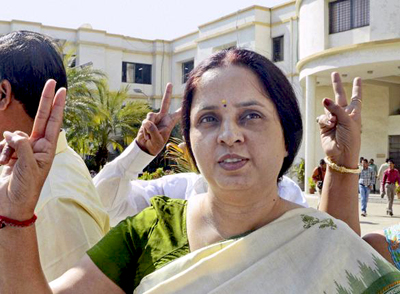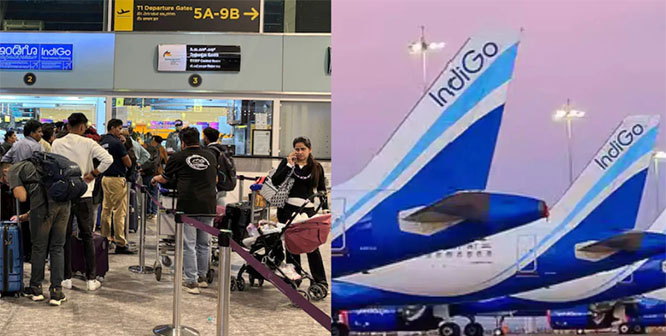
Ahmedabad, December 10: It is 8.30 a.m. on Saturday in the middle class area of Chandra Nagar. Jagruti Pandya, widow of former Gujarat Home Minister Haren Pandya, who was murdered in 2003, is doing a walkabout. She is the Gujarat Parivartan Party (GPP) candidate from the posh Ellisbridge constituency, which her late husband represented, and her decision to use this election to focus on the fact that all those charged with her husband’s brutal killing were let off last year, has created a ripple of interest. Her workers are a mix of friends and former BJP workers who have shifted allegiance to the GPP, led by the former Chief Minister Keshubhai Patel, who too walked out of the BJP.
In Maninagar — Chief Minister Narendra Modi’s constituency — his challenger, the Congress candidate Shweta Bhatt, the wife of IPS officer Sanjeev Bhatt, who has allegedly been victimised for making revelations about the role of Mr. Modi and his administration in the anti-Muslim pogrom in 2002, draws attention to injustice in the State: “If I win, it will be a victory for Gujarat; if I lose, Gujarat will lose,” she says with a theatrical turn of phrase.
As both women campaign — Ms. Bhatt in an SUV, Ms. Pandya on foot — door-to-door, people come out on to their balconies, some onto the streets. For these self-declared homemakers who have thus far had nothing to do with politics — even Ms. Pandya stresses she has never accompanied her late husband on the election trail — both answer questions with ease, their storylines smooth. They are also picture perfect — Ms. Pandya, serene, scrubbed face, subdued in a grey silk sari with the yellow GPP scarf draped over her shoulders; Ms. Bhatt effervescent in a bright red maheshwari sari, a big bindi on her forehead.
Neither Ms. Pandya, nor Ms. Bhatt is likely to win, say locals. But in an election in which the communal carnage of 2002 is not an issue, with the Congress tiptoeing around it lest it awaken old ghosts, the fact that these women have left the sanctuary of their homes to enter politics is the only reminder of the terrible happenings of a decade ago, and of Mr. Modi’s role in them.
The two women could not differ more in their ideological persuasions — Ms. Pandya considers the BJP-RSS combine as her family, while Ms. Bhatt says she accepted the Congress ticket as the party’s ideology matched her own. They refuse to say very much about the other, only stressing that the other is doing what she thinks is right. “All these years, I sought justice from the legal system. I failed,” Ms. Pandya stresses that “the BJP was Haren’s family, but he was let down. So I am contesting this election to seek justice in the court of the people.”
As she walks through the compounds of local cooperative housing societies, microphone in hand, she looks up at the balconies, introduces herself as Haren Pandya’s widow, reminds them of his work in the area and asks for their votes as shradhanjali [homage].
Mr. Pandya’s killing was always regarded as a political murder. While the prosecution’s case was that he had been killed by assailants from Hyderabad to avenge the anti-Muslim riots of 2002, it is well-known that he was the Minister who had secretly deposed before the Citizen’s Tribunal on the riots, making revelations that were not yet in the public domain. At a cabinet meeting, he had reportedly advocated against bringing bodies of the victims of the Godhra carnage to Ahmedabad, as he thought that would trigger off a violent response. But he was apparently shouted down at the meeting. Whatever the reason, Mr. Modi sacked him in July 2002, and ensured that he did not get the ticket from his Ellisbridge constituency in the Assembly elections later that year. After being forced out of electoral politics, Mr. Pandya was trying to figure out his next move when he was killed in Ahmedabad’s Law Gardens. His body was found in his car.
In Ms. Bhatt’s case, her husband is known for his role in filing an affidavit in the Supreme Court against Mr. Modi for his alleged role in the 2002 Gujarat riots. She says she is fighting to protest against the harassment of her husband and family, and to make it possible once again for the people of Gujarat to speak their minds: “There is no freedom of speech in Gujarat, I am fighting for that,” she says, adding that she is also focusing on the lack of development in Mr. Modi’s constituency.
In Congress circles, there has been much debate about fielding Ms. Bhatt, as it might be seen as the party “owning” Mr. Bhatt and undermining his credibility and his fight against Mr. Modi. But others felt that this was the closest the party could risk in making a statement about Mr. Modi’s alleged role in the 2002 riots.
The common thread that binds the battles being waged by these two women, whose world views differ so greatly, is that they have both dared to put the spotlight on a man most people in Gujarat regard as invincible and all-powerful. No small achievement, regardless of whether they win or lose their elections.








Comments
Add new comment